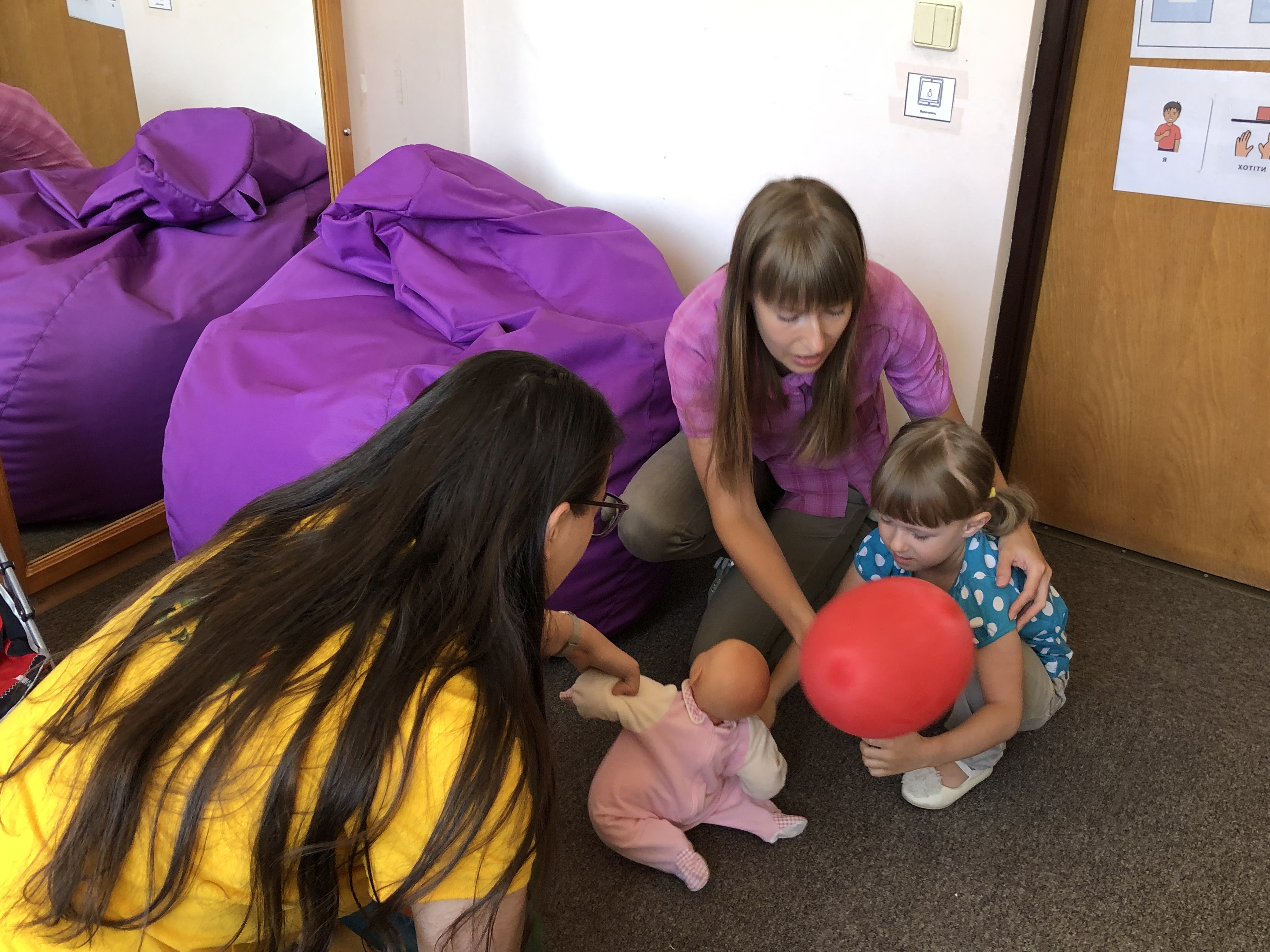
Listen to this story:
Lviv, Ukraine – Four-year-old Teona sits in a room filled with purple beanbags and other sensory toys, patting an inflated balloon vigorously with both her hands. She seems cheerful and vivacious, occasionally crying out in joy. Speaking to her in a kindly, measured tone is a play therapist, Sofia. Her job is to help Teona improve her social skills. Watching the two interact, it’s hard to imagine that the last few months have been intensely traumatic for Teona in ways that she cannot articulate.
For now, she is safe at the Dzherelo Children’s Rehabilitation Centre, an NGO offering rehabilitation services and treatment for young people with disabilities in the western Ukrainian city of Lviv. The journey was not easy, though. She and her mother, Viktoria Plyush, 33, fled by train, waiting fearfully at dangerous checkpoints before arriving on July 9, just over four months after Russian forces captured their hometown of Hola Prystan in the southern region of Kherson.
Teona has non-verbal autism, and before the Russians overran Hola Prystan she had been attending a kindergarten that provided play and speech therapy. For months, her mother clung to the hope that Ukrainian forces would liberate the area. Teona had been confined to their home for several months, unable to go to school or see any of her classmates, who had all gone to Poland or Romania with their families. She grew agitated, covering her ears and screaming constantly.
“All the facilities for children with developmental disabilities shut down because they refused to cooperate with the Russian occupiers, which we think is the honourable thing to do,” Plyush says. A mild-mannered woman with a determined gaze, she sits ramrod straight in her chair as she speaks, occasionally glancing at Teona as she plays with Sofia.
The family lived in fear. “Rockets were flying everywhere and there were no air raid sirens to warn us,” she recalls. The only times she left the house were to dash out to the market to buy food. The last straw came when she heard about the Russian army kidnapping civilians or fighters with Ukrainian loyalties.
Teona wailed throughout the arduous two-day journey from Hola Prystan into Lviv.
Now, Plyush, her husband and Teona live with her sister in Lviv. Plyush is relieved that Teona can resume the therapy she needs, and not be isolated any longer.
Despite her sunny disposition and the friends she’s made at Dzherelo, Teona is still on edge following her ordeal. After months at home with Plyush in Hola Prystan, she also has separation anxiety, screaming if her mother is out of sight for more than a few minutes.
But it’s not just Teona who has needed extra care after all the stress she has endured. Yaroslava Nikashin, 35, an easy-going and warm social worker at Dzherelo, says that her work in recent months has focused on supporting parents and ramping up psychological help and counselling for caregivers. “Some of the parents like her [Plyush] seem calm, but on the inside, they’re also really scared and sad,” she says.
Despite worries that financing for NGOs like Dzherelo will dwindle as the war drags on and most financial aid is diverted to the armed services, Nikashin has made up her mind to continue her work. “We have to try and maintain both the quality and quantity of the services we offer and give as much as we can,” she says.
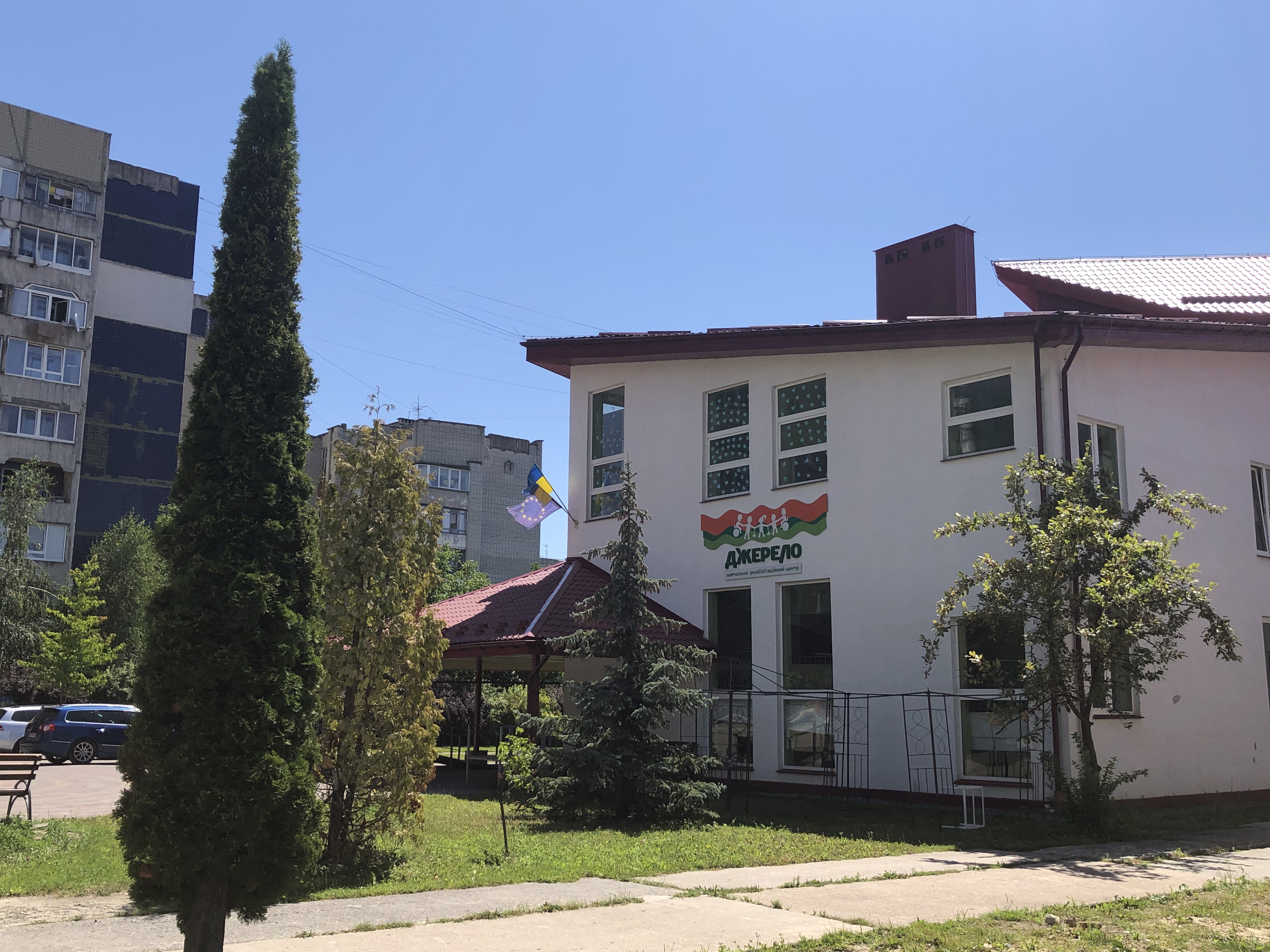
Challenges accessing support
As the Russian invasion grinds into its eighth month, Ukrainians with intellectual and physical disabilities – as well as their carers – continue to encounter huge challenges in accessing the support they need.
According to two Brussels-based NGOs, the European Disability Forum and Inclusion Europe, some 2.7 million people with disabilities are registered in Ukraine. Of these, an estimated 261,000 have intellectual disabilities. Both organisations have documented a drastic deterioration in the quality of life for Ukrainians with disabilities.
Some are unable to access medication or food, while those with developmental disabilities have seizures or become aggressive while frightened by shelling. In addition, wheelchair users or those with mobility issues are not able to access bomb shelters, so people with physical disabilities have no choice but to remain at home, leaving them at a disproportionate risk of death. Thousands more are believed to be trapped in care homes or poorly-maintained institutions, cut off from their communities and languishing in neglect.
Since the end of June, Dzherelo has been working with UNICEF and the Ukrainian government on an emergency intervention, dispatching mobile teams of medical experts to seven regions of western Ukraine, focusing on remote areas where children with physical impediments and developmental difficulties might struggle to receive the assistance they need. In total, Dzherelo has supported more than 750 families through this scheme and their Lviv facility.
Zoreslava Liulchak, the director of Dzherelo, says that in the early days of the war, the centre met people at the train station in Lviv who had carried their children for the entire journey from the east to western Ukraine, as they were not able to bring wheelchairs from home. “There’s also a big problem with leaving itself,” she adds. “The Russians often do not release people from the occupied territory.”
She cites the example of a rehabilitation specialist from Kherson who is now working at Dzherelo. Along with his two nephews who have cerebral palsy, he had to escape through Russian-controlled Crimea, as they were not permitted to leave via any other route. These stories are commonplace, Liulchak says, and such stressful journeys can “provoke complications in physical and psychological conditions” already experienced by children with disabilities.
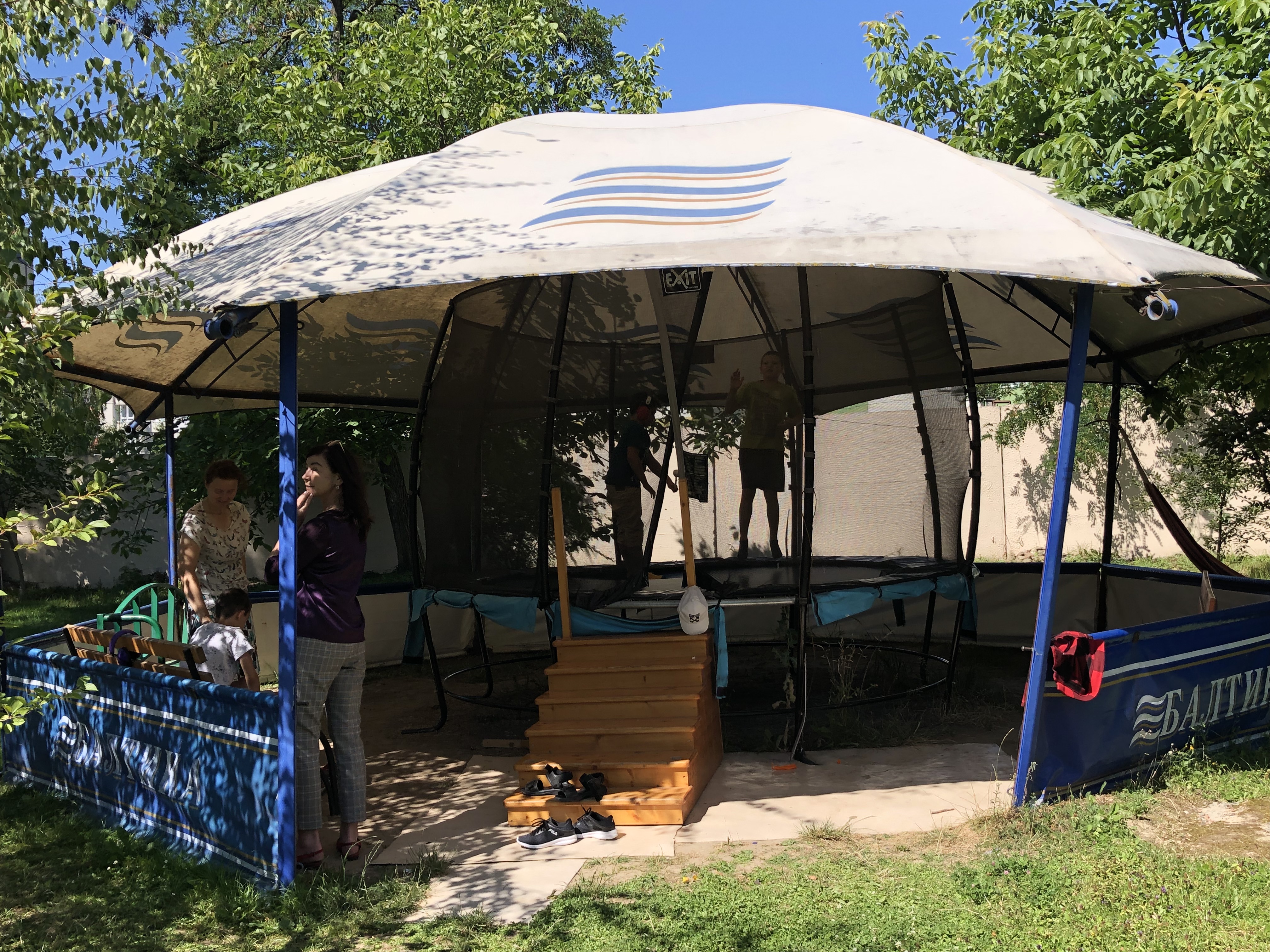
Gruelling, expensive work
Some 735km (575 miles) away in Galway, Ireland, 40-year-old Ukrainian disability rights activist Yuliia Sachuk is all too familiar with the frustrations faced by people with disabilities who are trying to evacuate to safety – whether to western Ukraine or abroad. As the chair and co-founder of Fight for Right, a female-led Ukrainian NGO for disability rights, Sachuk and her team of nearly 30 have been overworked arranging the delivery of essential medications, financial support and legal advice for more than 4,100 individuals in the disabled community since the end of February.
Sachuk was studying for a master’s in disability law in Galway when she returned home in early 2022 as tensions were rising in eastern Ukraine. She fled the country in the late hours of February 24, following the invasion, with her 17-year-old son and sister after hearing about a bombing near a medical facility for people with disabilities. Their train from Kyiv kept stopping amid explosions and she frantically texted other activists in neighbouring countries for help. One of her contacts helped the family get to Romania, and eventually to Ireland. Her husband has remained in Ukraine and is volunteering with the Territorial Defence Forces.
Sachuk says her work has been non-stop, gruelling and expensive. Arranging a medical evacuation for a person with disabilities, especially from the worst-affected cities, can cost the equivalent of $5,100 to $10,300 – in part due to the equipment needed.
The group started a GoFundMe online crowdfunding campaign to help with evacuations and support those who cannot leave with food and medicine. As of late September, it has raised 481,096 euros ($464,188) of its 700,000-euro ($675,390) goal. According to Sachuk, requests for help from people with disabilities continue to stream in.
Aside from receiving initial guidance from two US-based organisations – the Partnership for Inclusive Disaster Strategies and the World Institute on Disability – on how to set up Fight For Right’s response strategy, Sachuk says they were let down by other international disability charities.
“In the first months of the war, all these organisations were not helpful at all when it comes to direct support. Nobody worked with us,” Sachuk says. “If [we’re talking about] getting a person here and now to help a disabled person to their car, or to buy some food or medicine, all of these organisations have failed.” Ukrainian disability organisations were left on their own to save people, she says.
With sadness, she recalls the first few months of the war when she received goodbye calls and messages from people with disabilities in occupied regions. “They were stuck in their houses and they didn’t have the possibility of evacuation,” she says.
Sachuk knows intimately what it means to live with a disability. Born in the western Ukrainian city of Lutsk with severe congenital visual impairment, she was in and out of hospital throughout her childhood as she underwent multiple eye surgeries. Her sight is still poor today but she says she manages to get by with the aid of magnifying glasses and enlarged letters on computer screens. “When you have lived with this for all your life, you get used to it, and stop thinking of it as a problem,” she says.
She credits her parents for fighting for her to attend a state-run school, instead of one of the boarding schools for children with disabilities that are infamous for rampant abuse and mistreatment. At school, she was bullied by classmates.
She remembers hearing stories about children with disabilities who were confined to their homes as some parents were ashamed of them. “It was just not talked about so much in the past,” she says.
Sachuk is proud of how Fight for Right has brought people with disabilities safety and comfort. She recalls how, in June, her team helped organise the delivery of a prosthetic breast from Germany to a woman in the northeastern city of Kharkiv in Ukraine. The woman had had a mastectomy following a breast cancer diagnosis and was also suffering from mobility problems. “She was just so, so happy. She couldn’t believe it was possible,” Sachuk remembers.
Routine is critical
One formidable task for NGOs working with people with developmental disabilities is the pressure to provide stability amidst the turmoil of war. Routine is especially important for children with autism; disarray can jeopardise any progress that comes with therapy.
Anna Perekatiy, founder of the Start Centre in Lviv, an NGO that supports children with developmental disabilities, says 35 displaced families from regions in eastern Ukraine that were shelled intensely by the Russians, such as Kherson, Donetsk and Mykolaiv, have come to her for help since the start of the war. They have children with a range of physical, developmental and learning disabilities. Some 90 percent of them have autism.
“These children need stability, they need permanent therapy to help them develop crucial skills,” says Perekatiy, who has a 12-year-old son with autism. She stresses that children’s development deteriorates quickly when pedagogical therapy is put on pause.
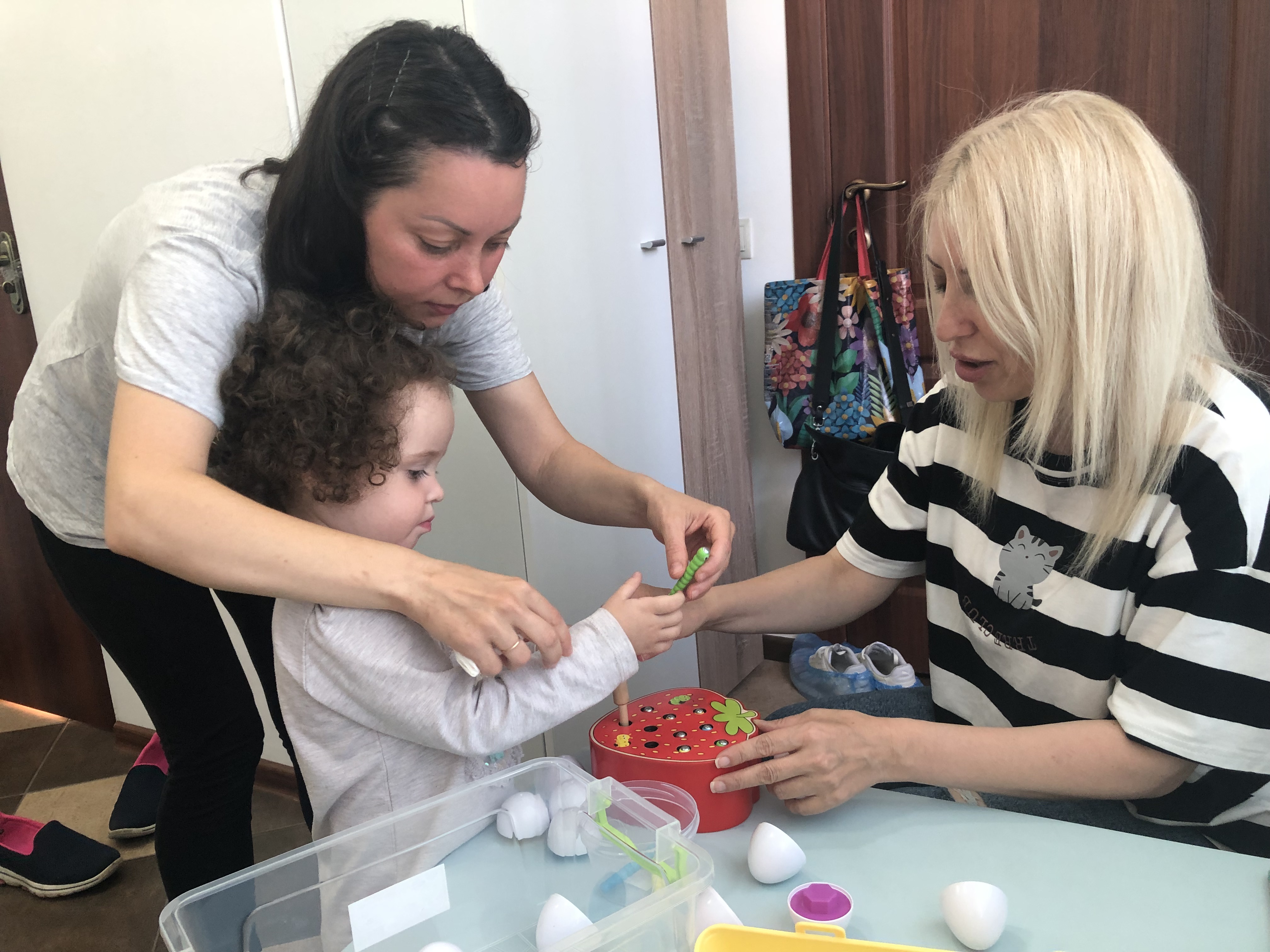
Two-year-old Alisa has non-verbal autism – a diagnosis that she only formally received upon arriving in Lviv from her home in Berdyansk in southeastern Ukraine. Her mother, 37-year-old Olha Chermayina, cries as she describes how Alisa’s behaviour changed when the Russian occupation began. “She stopped making eye contact and shut down completely,” Chermayina recalls. As doctors fled the city, there was no proper medical care for children, and Alisa had no access to speech therapy.
When the family began to feel the impact of food shortages, they decided to flee. Upon arriving in Lviv, Chermayina and her husband Shota took Alisa to a children’s hospital, where a doctor confirmed she had autism. “He said we would have to start her treatment right from the beginning,” Chermayina says. “We’re taking a risk in staying here, but … we don’t know if she’ll get the care she needs if we go abroad, and there’s no guarantee that she can get used to it there.” Today, Alisa goes to the Start Centre five times a week.
Many children with disabilities were deprived of educational opportunities once the war started, as they could not partake in the online learning offered in mainstream schools. Perekatiy is also frustrated by the lack of governmental support, with the majority of rehabilitative services provided by NGOs like hers. She says the “old Soviet education system”, where the learning needs of people with disabilities were largely ignored, has meant that those who need support still feel stigmatised. Though she is optimistic that attitudes are changing, she worries that recognition of these needs won’t come quite fast enough for those most affected by the war.
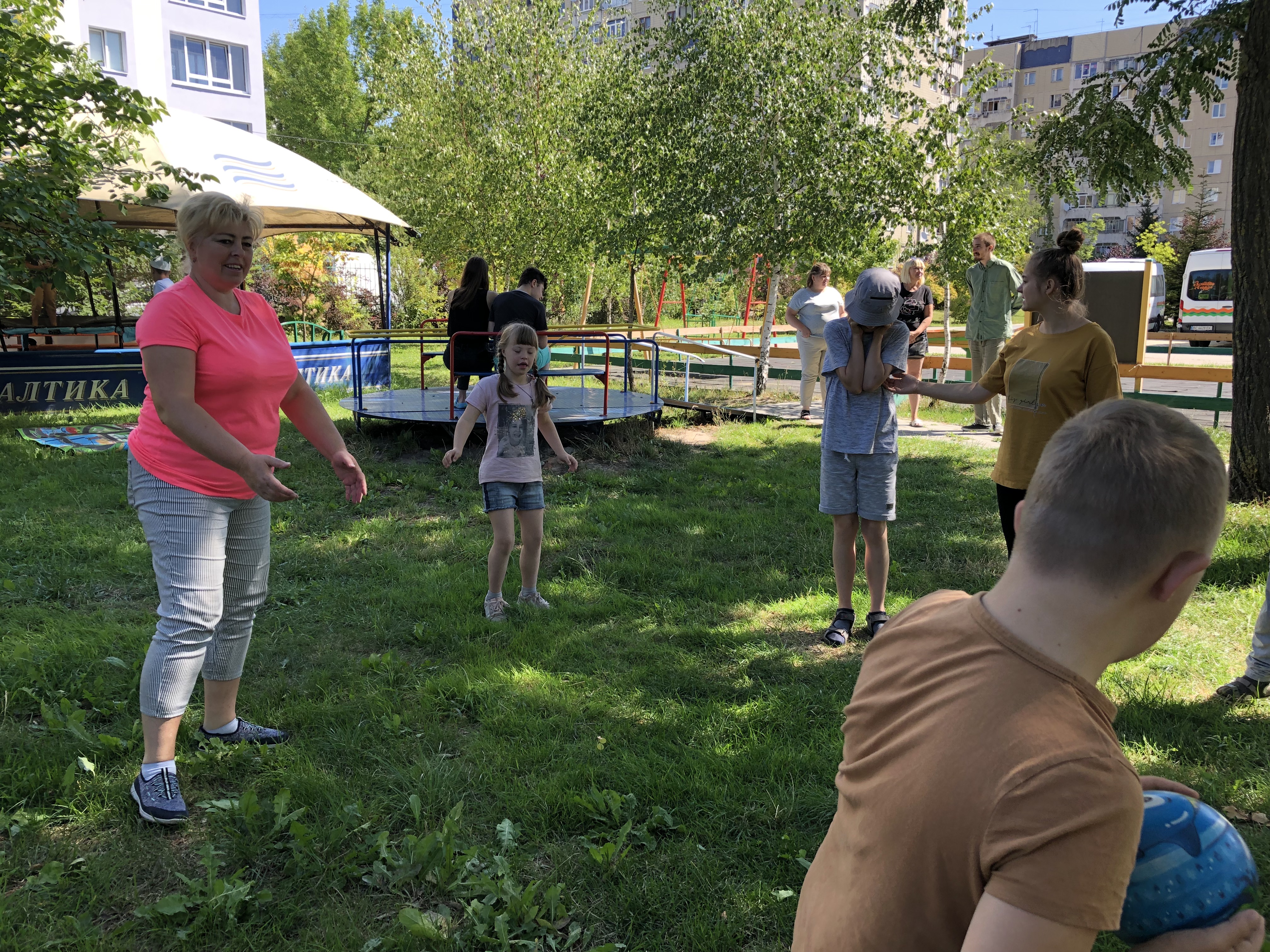
Structured environment
Even for children with intellectual disabilities who may not have outwardly shown signs of trauma, a structured environment is just as important for their development. In Dzherelo’s spacious garden, with its trampoline and playground, Olena Filippova watches her daughter, nine-year-old Milena, play with other children.
At the beginning of April, Filippova travelled with Milena, who has Down’s Syndrome, westward from their home city of Bilytske in Donetsk. Unable to get on a bus to Poland, she decided to stay in Lviv and enrol Milena at Dzherelo for play therapy five days a week. For the time being, the pair lives in an overcrowded dormitory for internally displaced people where the conditions are dismal. But Filippova, 49, a secondary school teacher, hopes to secure a teaching job in the autumn.
Milena, who has limited speech and communicates predominantly with gestures, is curious and observant, having picked up new words in Ukrainian simply by listening to other people. Since she grew up speaking Russian, the linguistic switch is particularly remarkable. “But she’s very mischievous,” Filippova laughs. “Once she knows a new word, she’ll say it once but refuse to repeat it. It’s like she’s making fun of me.”
For Milena, it was only after the war started that she began receiving specialist care. In Bilytske, Milena attended a regular kindergarten where Filippova says the teachers “made sure to be very inclusive” and had similar play therapy but for only two hours a week, which her mother felt wasn’t sufficient.
“My daughter was born at a time when rehabilitation centres [for children with learning disabilities] were just starting to open,” she says. As the field opens up and improves, she hopes that “with this change of circumstances, Milena will start talking to me”.
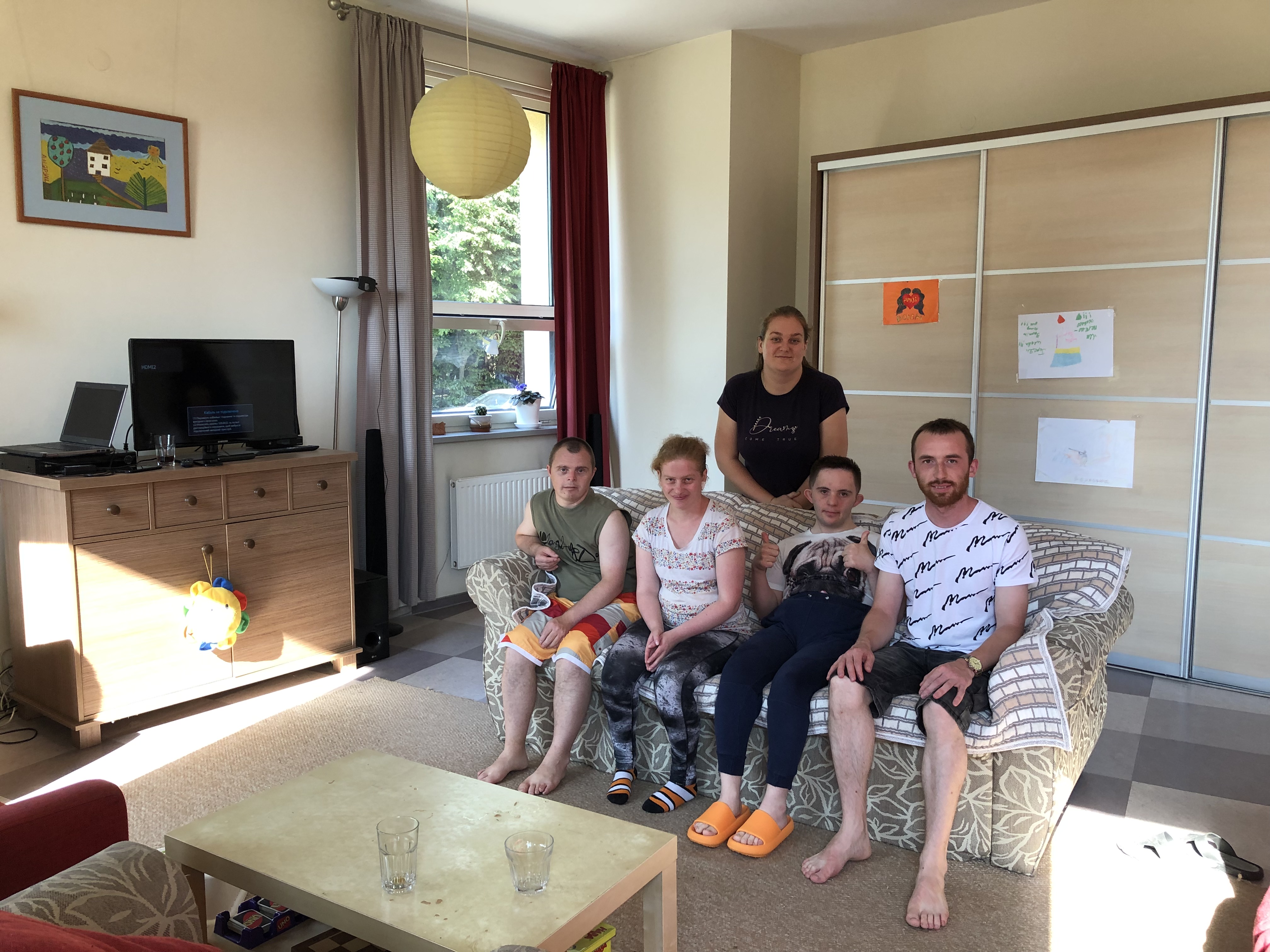
A glimmer of hope
At the Emmaus Centre, a home for adults with intellectual disabilities on the grounds of the Ukrainian Catholic University in Lviv, residents offer fellow members of the disabled community a glimmer of hope by showing how stability and opportunities can facilitate social integration.
Emmaus provides individualised care – its four assistants live on site and support its five permanent residents – aged between 25 and 45 – with all aspects of their lives, from vocational training to employment to daily tasks such as shopping for groceries. At Emmaus’s request, the residents interviewed are referred to by their first names only.
The atmosphere in the home is relaxed and inviting, the residents chatting and laughing with each other. Sitting at the dining table in a cosy room lit by the afternoon sun, 32-year-old Ivanka speaks enthusiastically about her experiences with the 500-odd displaced people with disabilities who have over six months sought refuge at Emmaus and its surrounding dormitories for a few days at a time. Emmaus supported their subsequent evacuation to other countries in Europe.
Ivanka, who has a developmental disability, attended a boarding school for years, only coming to live in Emmaus in September 2017. “It was good when the refugees came because I was able to volunteer as a nanny for some of their children,” she says. In particular, she misses a pair of twin boys who were five months old and had mobility issues. Prior to the war, she had been regularly attending a workshop where she learned to craft origami and artwork for sale. “I stopped going because it was not safe. There was no bomb shelter near the place where the workshop was held. But I hope to go back soon,” she says with a smile.
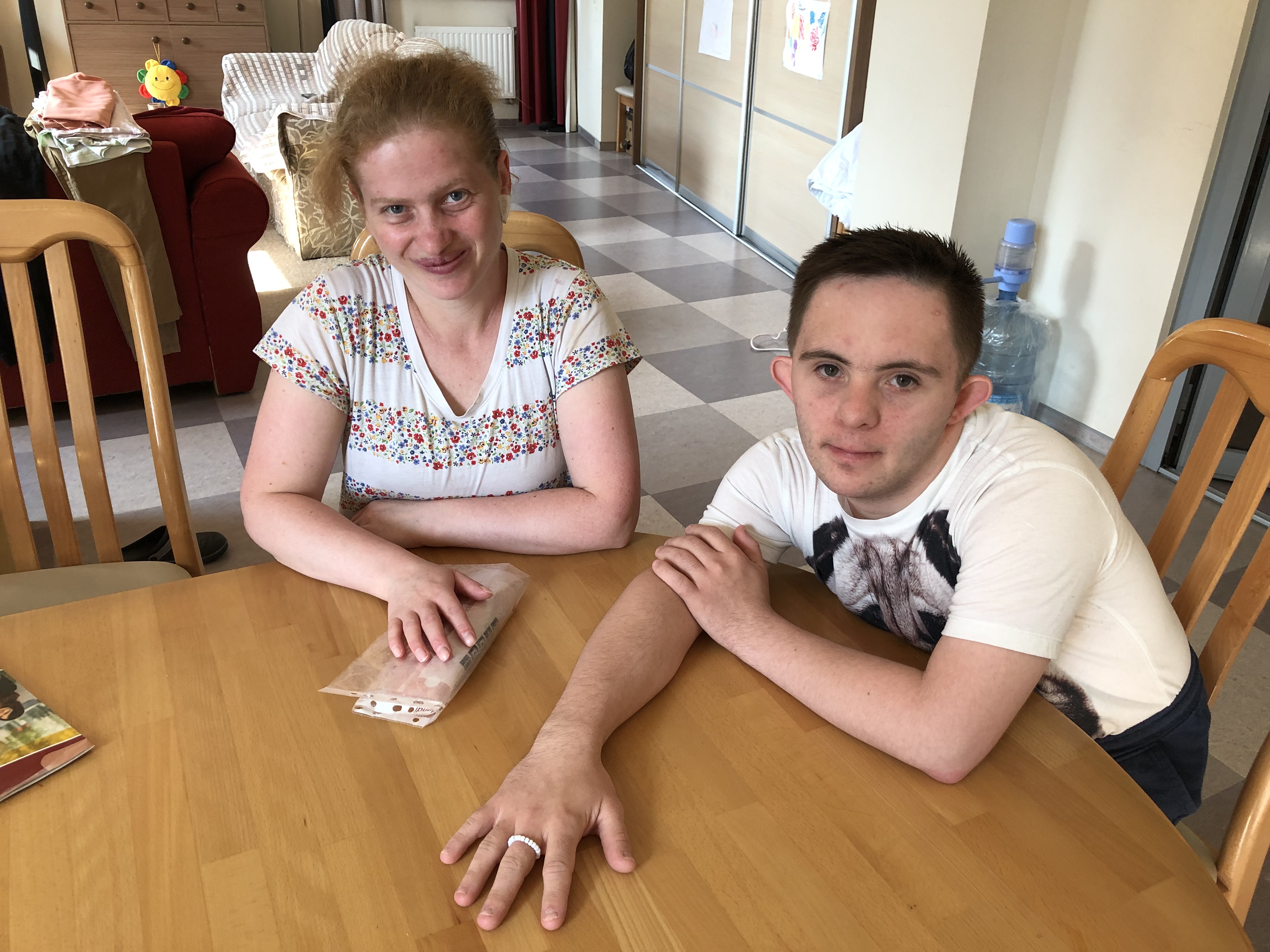
Two of her other housemates found their lives severely disrupted when the war began. One, 33-year-old Volodymyr, who has Down’s Syndrome, lost his job as a cleaner in a tech company several months ago. Having immensely enjoyed it, it was he who first suggested that other residents of the house would benefit from working.
“We are hoping to find him something else in the meantime,” says Tetiana Chul, one of the assistants at Emmaus.
“But it is still important to help out,” Volodymyr interjects. With not much on his plate at the moment, he spends his days cooking and cleaning for his roommates, and often volunteers to do chores on behalf of the staff. In his free time, he watches TV programmes from the 1990s and dreams of visiting Turkey, where one of his favourite soap operas is set.
Another resident, 25-year-old Danylo, who also has Down’s Syndrome, was taken by his family to Poland at the start of the war. “They felt I would be safer there. It was fun and I enjoyed going to school in Poland, but the language barrier was difficult for me,” he confesses. He ended up missing his friends in Lviv so much that his family agreed that he should return – and now he is back at Emmaus.
Danylo thumbs through a photo album to show Al Jazeera photos of his time in Poland. Suddenly, he recalls his mother, who died a few years ago and whom he calls his best friend. “Her lifelong dream was for me to live in a place like this, where I could be independent, and loved. I miss her very much,” he says, choking up with tears.
As Ivanka pats him on the shoulder, Chul holds out her hand to comfort him, and he kisses it. “Because of you, I am happy now,” he tells them.







